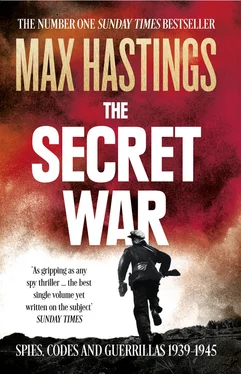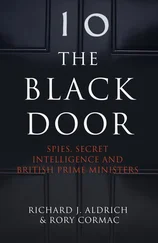Rössler, a small, grey, bespectacled German émigré born in 1897, was an impregnably enigmatic figure, of a kind that populates many spy sagas. A socialist journalist, he fled from the Nazis in 1935 and set up a little publishing business in Lucerne – the city that prompted his codename. He began writing under the name of R.A. Hermes, describing the Nazi persecution of Jews and warning that the Nazis would reoccupy the Rhineland. Berlin identified ‘Hermes’, and in 1937 deprived Rössler of his German citizenship. He nonetheless retained many connections in his homeland, especially within the Wehrmacht. Short of both friends and cash in Switzerland, he began to provide information to a private intelligence agency called Buro Ha, based at the Villa Stutz south of Lucerne, and run by an ardent anti-Nazi named Captain Hans Hausamann. Buro Ha had informal links to Swiss intelligence, which for a season thereafter provided some protection for Rössler.
He secured a steady flow of information from Germany, and apportioned varying quotas to Swiss, British, Czech and Soviet purchasers. Though his anti-Nazi credentials were not in doubt, he was principally and of necessity a mercenary – all his customers had to pay cash. By 1942 he had become by far the GRU’s most important Swiss source, the key figure in the Radó network. Moscow Centre, mistrustful of this shadowy figure, insistently demanded that Radó should make Rössler identify his sources, and the journalist equally stubbornly refused to do so. For all his later importance, it remains unclear how much intelligence he provided in 1941. Rössler went to his post-war grave still silent about the identity of the Germans who had provided him with useful, even sensational material. Subsequent speculation has focused on Col. Hans Oster, deputy head of the Abwehr; Hans Gisevius; former Leipzig mayor Gördeler; and two unnamed Wehrmacht generals.
Uncertainty also persists about the timing and wording of some of the Swiss Ring’s messages and their supposed warnings to Moscow, both before and after ‘Barbarossa’. All that can confidently be said is that the GRU received a stream of messages from Switzerland in the spring of 1941, some of which strongly indicated that Hitler intended to attack Russia. Equally significant for the strategic debate in Moscow, Centre learned that Rudolf Rössler had been, and probably continued to be, an informant of MI6’s Bern station. It was only one step from this knowledge to a belief inside the Kremlin that the ‘Lucy’ Ring had become an instrument of Churchill, peddling false information to drag Russia into the war.
Stalin’s Japanese sources told much the same story as his Swiss ones, though since the outbreak of war in Europe the strain of sustaining twin lives, occupying a much higher profile than the ‘Lucy’ spies, had exacted an ever worsening toll on its principal agent. Richard Sorge strove to use his influence to dissuade the Germans from war with Russia. He told the Tokyo embassy that Nomonhan – the summer 1939 Russo–Japanese border clashes – had been a disaster for the Japanese, and that Berlin should notice the effectiveness of the Red Army and of Zhukov, its local commander. Then came the huge shock of the Nazi–Soviet Pact, which stunned the Japanese government.
And Sorge. The spy reported on 12 August 1939 the movement of twelve Japanese divisions to Korea and Manchuria – the real total was twenty – in case the government decided on war, but he expressed his own conviction that Japan would hold back, and indeed on 4 September Tokyo formally announced a policy of non-intervention. Sorge told Moscow, on Hotsumi Ozaki’s authority, that the country would enter the war only when it was confident that it had identified the winner. He added that the German embassy expected the Japanese to remain neutral, and was even nervous they might join the Allied camp.
Sorge’s surreal relationship with Col. Ott’s mission took a new twist when he was offered a staff post as its press attaché. He declined, as usual because he was fearful of the security checks into his past that acceptance would have provoked, but he worked four hours a day in the embassy building, while assuming a new journalistic role as a stringer for Frankfurter Zeitung . It was scarcely surprising that in October the Japanese police foreign section, the Tokko, committed an agent – twenty-eight-year-old Harutsugu Saito – to shadow Sorge. They suspected that he was spying … for Germany. Saito noticed Max Clausen and began to take an interest in him, too.
During the months that followed, stresses on the network intensified. Branko de Voukelitch disclosed his work for the Soviets to his adored Japanese lover Yoshiko. In 1940 the couple were married, and she never betrayed him, but his indiscretion was appallingly risky. Max Clausen became grossly overweight, and his health deteriorated. Bedridden for some time, he had to get his wife Anna to assemble the transmitter before tapping out messages to Moscow from his sickroom. His employers were unsympathetic. Clausen was peremptorily informed by the Fourth Department that funding was tight: pay was being reduced. His little blueprint reproduction company employed fourteen people, had opened a branch in Mukden and was fulfilling assignments for the Japanese War and Navy Ministries. Moscow said that he must henceforth subsidise himself out of its profits. In a farcical twist, Clausen became increasingly admiring of Hitler – who was, after all, now supposedly Stalin’s friend.
But the radioman kept sending: in 1940 he transmitted sixty times, sending 29,179 words of Sorge’s wisdom. Prominent among the spy’s scoops was the draft of a proposed Japan–China peace treaty. It was deemed a vital Soviet interest to keep the China war going, because its termination would free the Japanese army to strike at Russia. When the treaty leaked and the draft was torn up, Sorge was also able to supply the substitute version – though this, too, remained unsigned. From the German embassy he secured data on the Mitsubishi and Nakajima aircraft factories. He provided accurate forecasts on Japan’s aggressive intentions towards French Indochina. He was not infallible, however, and gave Moscow some cause for scepticism. He predicted, for instance, that the British would reject Tokyo’s demand for closure of the Burma Road supply route to China shortly before they did so for three months. As is so often the case with intelligence, Sorge’s original report was not mistaken: Churchill simply changed his mind.
By the end of 1940, Sorge’s standing was higher in Berlin than in the Kremlin. Indeed, the excellence of his reports for the Nazis almost caused his undoing: Schellenberg of the RSHA ran a security check which revealed his communist past. The Gestapo’s Joseph Meisinger was posted to Tokyo as embassy security officer, with orders to look closely at Sorge, though as yet the Nazis had no suspicion of his supreme duplicity. Meisinger was ill-equipped for his task: a creature of Reinhard Heydrich, he was a thug whose reputation rested upon a few months of orchestrating brutality in Warsaw. Much more serious for the spy ring was the fact that some of its principal members were breaking down. Though Sorge sustained his journalistic career, penning fifty-one articles for Frankfurter Zeitung in the first six months of 1941, his nerves were shredded. His drinking worsened, and Hanako found him an increasingly violent lover. When she sobbed and begged him to explain himself, he responded sullenly, ‘I am lonely.’ She said, ‘How can this be, when you have so many German friends here in Tokyo?’ He muttered, ‘They are not my true friends.’ In a September 1940 signal to Moscow, he said that he was forty-four years old and desperately tired. He yearned to be allowed to go ‘home’ to Russia, though he must have known that Centre would never countenance this until the war ended.
Читать дальше












